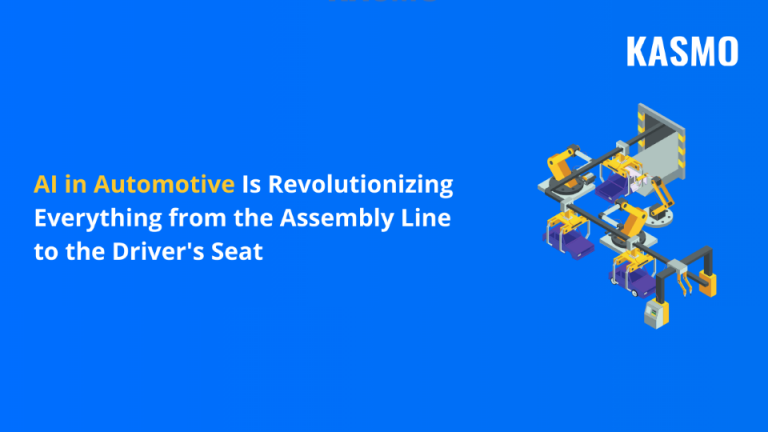When we think of AI in automotive industries, autonomous vehicles steal the spotlight. But the truth is, the impact of AI extends much beyond self-driving technology. Today, artificial intelligence is driving a much broader transformation and is redefining how vehicles are designed, manufactured, sold, and experienced.
The automotive industry is manufacturing smart automobiles with greater software features, where performance is determined by software instead of just hardware. Automakers are now investing in technologies that drive automotive intelligence with faster innovation and more connected, customer-focused experiences.
To fully harness the potential of AI, manufacturers must first overcome legacy infrastructure and fragmented data systems that are slowing down business growth. Once data is unified, more room is created for intelligent automation, predictive insights, and AI-powered agents that elevate every phase of the customer journey.
In this blog, we will explore how AI is reshaping customer experience in the automotive industry, why embracing this transformation is crucial for your automotive business and how you can stay ahead of the competition.
How is AI used in the automotive industry?
AI is helping automakers build smarter vehicles, deliver better customer experiences, and streamline operations like never before. To deliver on the promise of a fully connected driving experience, automakers and manufacturers need to break down data siloes across departments like sales, marketing, finance, and R&D. Once data is connected, they can drive highly personalized, immersive, and truly connected experiences for customers.
There’s a massive opportunity for AI agents to help automakers and dealers increase sales, drive customer loyalty, and build brand affinity by improving these experiences and staying ahead of automotive industry trends.
Here’s how AI is transforming key areas of the automotive industry:
Smarter Manufacturing and Quality Control
AI is optimizing manufacturing processes by powering intelligent automation and robotics on the production line. These AI-driven systems reduce human error and can identify inefficiencies, predict maintenance needs, and improve precision in assembly. For example, machine learning algorithms detect component defects in real time, ensuring quality control before issues escalate from the customer’s end.
Connected Car Experiences
Connected, smart automobiles are on top of automotive industry trends. AI acts as the brain behind intelligent infotainment systems, predictive navigation, and driver safety features. From real-time traffic updates to personalized media and climate settings, AI learns and analyzes driver preferences and continuously adapts to enhance in-vehicle driver experiences.
Another impactful use case of AI in automotive lies in how it powers Advanced Driver-Assistance Systems (ADAS), which can detect hazards, alert drivers, and even take corrective action in critical situations. These systems are laying the foundation for safer roads and better self-driving experiences.
AI-Driven Supply Chain Optimization
Supply chains in the automotive industry are complex and global, making efficiency a constant challenge. AI is helping automakers streamline supply chain operations through demand forecasting, inventory optimization, and intelligent production planning.
By analyzing large datasets like market trends, weather disruptions, and geopolitical risks, AI systems provide real-time insights that enable faster, more informed decisions. This predictive capability reduces operational costs and helps your business stay ahead of customer expectations in today’s volatile markets.
Personalized Customer Experiences
AI is transforming the way automotive dealerships engage with customers. Through intelligent chatbots, virtual assistants, and product recommendations to customers, dealerships can offer highly personalized and responsive customer service throughout the customer journey.
Whether it’s a chatbot answering questions on a dealership’s website or a virtual assistant guiding a customer through financing options, AI delivers a seamless and tailored experience. Data-driven insights allow internal teams to better understand customer behavior, refine marketing strategies, and foster long-term customer loyalty.
Advancements in Autonomous Driving
The development of self-driving vehicles is at the forefront of innovation in the automotive industry. AI enables these vehicles to process data from sensors, cameras, and other devices in real time, which helps in making split-second decisions, predicting road conditions, and coordinating with other vehicles in traffic.
Challenges of AI in the Automotive Industry
Artificial intelligence is driving immense transformations across the automotive value chain. But many automotive businesses face several obstacles with AI adoption, from technical complexities to privacy concerns. Let’s look at some key challenges:
Data Silos and Integration Issues
In most automotive organizations, data exists in disconnected legacy systems. Integrating these diverse data sources across R&D, manufacturing, supply chain, and sales is a major hurdle that slows AI deployment and limits its effectiveness.
Disconnected Customer and Vehicle Data
Automotive companies often store customer, product, and vehicle performance data in separate systems. This makes it challenging to get a 360-degree view of the customer journey, and teams are unable to predict customer service needs accurately. Due to this, automotive brands find it difficult to deliver personalized experiences to their customers.
Limited Visibility into Operations
Automotive companies find it challenging to track data on consumer behavior, vehicle performance, and customer feedback across their stakeholder networks in real time. Without this visibility, opportunities to improve service efficiency and upsell to customers are missed.
Inconsistent Customer Engagement
The inability of marketing and sales teams to engage customers in a relevant manner at each touchpoint in their buying journey often results in inconsistent messaging. This makes it challenging for automotive brands to acquire new customers and even retain existing ones.
Reactive Decision-Making
Many automotive companies rely on historical customer data records rather than predictive insights based on real-time consumer data. This leads to delayed responses to consumer needs and poor quality customer service.
Manual, Time-Consuming Reporting
Generating customer portfolios and sales reports across various regions and among different stakeholders is generally slow and inconsistent. Data is spread across different systems like CRM, retail databases, and digital marketing platforms, making it difficult to gain a comprehensive and accurate view of consumer needs and behavior. The lack of data unification not only delays reporting but also increases the risk of losing customers.
Cybersecurity Risks
Connected, AI-powered vehicles increase the risk of cyber threats. Ensuring the security and integrity of data is crucial, as even a single breach into vehicle and customer data can compromise driver safety, decrease consumer trust, and damage brand reputation.
Elevate the AI Strategy for Your Automotive Business with Salesforce
Consumers’ expectations for the automotive experience have increased:

Salesforce offers Agentforce for Automotive, which empowers you to build a limitless workforce by combining digital agents with your human teams. With 24/7 support, these AI-powered agents handle repetitive tasks, assist customers, and enhance employee efficiency, allowing your teams to focus on building better customer relationships.
Salesforce Agentforce goes beyond elevating customer experience and transforms core operations, from design and engineering to sales and marketing. You can equip your teams better and drive efficiency, automation, and personalization across processes.
Pre-Built AI Capabilities
Agentforce offers pre-built AI solutions designed specifically for the automotive industry. These unique capabilities help identify vehicle issues, schedule customer service appointments, and send personalized summaries with estimates, which conserve time and increase operational efficiency.
Automate Proactive Maintenance
Manual effort is reduced with AI that automates routine tasks like diagnostics and customer communication for common queries. By streamlining operational workflows, Agentforce ensures faster response times and improved service experiences for drivers.
Customize with Low-Code Tools
Whether it’s sales, service, or manufacturing, Agentforce empowers teams to build custom agents for any automotive scenario without requiring a single line of code. With intuitive low-code tools and built-in automotive functionality, creating powerful AI agents becomes a cakewalk.
Leverage AI for Automotive
With datasets and workflows tailored specifically to the automotive industry, Agentforce allows automakers to launch AI-powered solutions quickly. It is configured beforehand to support the unique challenges and use cases across the automotive value chain.
Enhance Data Security
Agentforce is backed by the Einstein Trust Layer, ensuring data privacy, security, and compliance at scale. You can confidently deploy AI solutions while maintaining trust with customers and meeting regulatory standards.
Drive Successful Salesforce Implementation with Kasmo’s Expertise
If you’re planning to implement Salesforce Automotive Cloud to streamline operations, Kasmo is your go-to partner. Our experts have deep Salesforce expertise and a strong understanding of the automotive industry. We help businesses elevate customer engagement, enable data-driven decision-making, and improve overall operational efficiency.
As a trusted Salesforce Summit Partner, Kasmo delivers tailored, scalable solutions to clients worldwide. Our certified experts ensure a smooth implementation of Salesforce Agentforce for Automotive, empowering your teams to deliver personalized customer experiences, increase lead conversions, and drive higher revenue. We offer strategic guidance during the implementation process – helping you adapt, compete, and succeed in an automotive sector that is ever-evolving.
Conclusion
AI is a powerful catalyst for transformation that’s already reshaping how automotive businesses operate and engage with consumers. With the rise of agentic AI, there is a great opportunity for automotive businesses to enhance customer strategies, modernize operations, and accelerate innovation.
By adopting advanced AI technologies, automakers are building safer, more efficient, and customer-oriented vehicles that align with automotive industry trends and evolving market demands. As AI adoption expands across business functions, it will redefine the future of mobility and how consumers interact with vehicles.
Salesforce Agentforce, implemented by Kasmo for your unique business needs, enables your teams to deploy autonomous AI agents that act as virtual assistants, which are capable of handling everything from real-time vehicle diagnostics to personalized customer recommendations. Beyond enhancing customer experience, integrating AI in automotive operations helps in building intelligent automation systems that support scale, improve efficiency, and optimize workflows.




